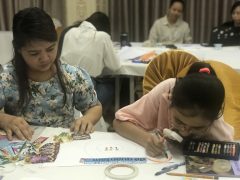Engendering Disability-Inclusive Development (EDID) Vietnam case study: Fieldwork Activities
June 2023
Local workshop and Dialogue Forum: “Eliminating barriers for women and girls with disabilities”
Hanoi, Vietnam
During EDID Vietnam project’s second fieldwork sessions, we undertook two significant activities. The first activity involved a local workshop on 21-22 June 2023, wherein women and girls with disabilities collaborated to identify key issues and to strategize their approach for the upcoming dialogue forum. The workshop therefore sought to further address issues that were identified during the first fieldwork session, and to explore and inform the participants ideas for the upcoming forum.
Subsequently, the dialogue forum took place over two days, from 22 to 23 June 2023, in Hanoi. In collaboration with local partners, including the Hanoi Association of Disabled People (DP Hanoi), UNICEF Vietnam, and the Ministry of Education and Training (MOET), a two-day dialogue forum was organized to discuss the issues previously identified by the girls and young women, and to mobilize efforts for the elimination of the barriers they face.
The objectives of the dialogue forum were as follows:
- Sharing the preliminary findings from the first stage of the EDID-Vietnam case study.
- Facilitating policy dialogues concerning two primary areas: (i) the impact of laws and policies affecting the lives of women and girls with disabilities, and (ii) the barriers encountered by them in advocacy and decision-making processes.
- Engaging participants in knowledge-sharing and mobilization efforts concerning these issues.
- Contributing to the establishment of a supportive network and connections for women and girls with disabilities in Vietnam.
- Creating a constructive space that encourages government policymakers, international partners, local communities, and research institutions (including universities) to participate in dialogues supporting women and girls with disabilities in Vietnam.
The dialogue forum garnered interest from various stakeholders, including participants from MOET, the Ministry of Labour Invalids and Social Affairs, leaders from the Association of Disabled People and its affiliated branches, organizations representing people with disabilities, as well as representatives from UNICEF Vietnam, UNDP, the Canadian Embassy, and Humanity and Inclusion Canada.
Participants were provided with an open platform to discuss issues concerning equal access for women and girls with disabilities across various areas. Education emerged as a particularly significant topic of debate, with participants engaging in discussions with the Deputy Director General of the Department of Primary Education.
Throughout the two-day forum, women and girls with disabilities actively shared their knowledge and mobilized support for the identified issues. They drew upon their lived experiences, highlighting the barriers they faced and expressing their unique demands through powerful manifestos. In preparation for this forum, women and girls had worked together for two days in the local workshop to develop their agenda. They also participated in discussions on the use of art-based methods to enhance their advocacy efforts. The manifestos of women and girls with disabilities were conveyed through collages and artworks, offering a novel approach to capture the attention of policymakers and the community while advocating for their concerns and leveraging their expertise. The second fieldwork session revealed an improvement in women’s leadership and girls’ participation, with the women actively supporting the younger girls in raising their voices in the dialogues.
Through this forum, representatives from the government and stakeholders gained valuable insights into the barriers faced by women and girls with disabilities in accessing education, employment, and other public services. Moreover, the forum presented a distinctive opportunity for national and international disability rights activists to exchange knowledge and insights regarding their activism within the local and global contexts through a panel discussion that created connections with transnational activism, all in an effort to remove barriers for women and girls with disabilities.
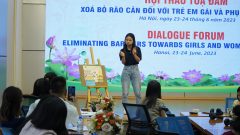
A young deaf girl was presenting her manifesto. Through her presentation, she addressed the issue of inclusive education for the deaf community.
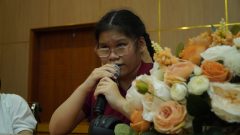
A young girl shared her experiences regarding barriers to accessing books in braille for blind students.
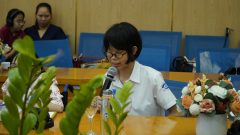
A young girl raised the issue of violence against students with disabilities.
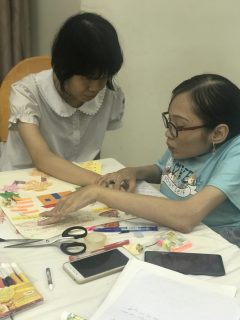 |
|
| Women supported girls in presenting their manifestos. | Women and girls worked in groups to develop their manifestos. |
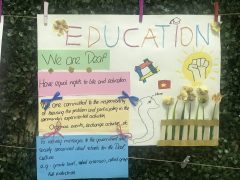 |
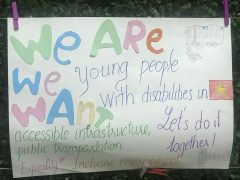 |
|
Artwork by women and girls with disabilities show their manifestos. |
|
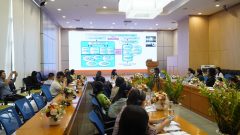
Ms Saowalak Thongkuay – an activist for the rights of women and girls with disability in Thailand and the Asia Pacific – share her experiences.
